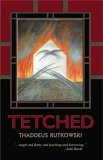 I'll be honest: I'm biased, I planned to like TETCHED, Thaddeus Rutkowski's latest novel, and it went according to plan. I'm a fan of Rutkowski's fragments or "fractals," kernels of prose inside chapters and sections that echo the smaller kernels. Reading Rutkowski is like opening a matrioshka doll, playing with the parts, then putting her back together.
I'll be honest: I'm biased, I planned to like TETCHED, Thaddeus Rutkowski's latest novel, and it went according to plan. I'm a fan of Rutkowski's fragments or "fractals," kernels of prose inside chapters and sections that echo the smaller kernels. Reading Rutkowski is like opening a matrioshka doll, playing with the parts, then putting her back together.For fans of Rutkowski's first novel, ROUGHHOUSE, the first half of TETCHED returns to that home territory. We hang with the Caucasian, loose-cannon, stay-at-home father, who plots armed revolution, drinks, brings a drifter into the house, and blames his failed art career on his kids. We savor moments with the pragmatic, but enigmatic Chinese mother, who blends her medical knowledge with cryptic stories from her childhood. And we anchor ourselves to the loveable, unnamed narrator, an ethnic anomaly in his rural high school, who has a pyro streak and explores issues of control (and lack thereof) with his own body, through self-torture.
What makes TETCHED and the rest of Rutkowsi's oevre remarkable to me is the emotionally cool tone of the "fractals" of text. It is not cool-for-coolness'-sake. The unsafe terrain of home is inherently charged, and could become melodramatic in the telling. But the language here has an organic humor akin to the self-experimentation of its narrator, more curiosity than wit, more let's-see-what-happens than let-me-tell-you-what-happened. Instead of hearing a confession, we get to experience the snapshots of memory from a simultaneously detached and internal place.
The effect of this choice is interesting: instead of responding to emotional promptings in the text, I have a response to the cumulative effect of the cool-curious moments. In the case of ROUGHHOUSE I closed the book with a feeling of melancholy. (A friend had a similar reaction: she "just wanted to hug" the protag.) But in the case of TETCHED, while the material is similar in content, the emotional effect, for me, was far different. The key is in how Rutkowski arranges the pieces. TETCHED has a certain giddy glow.
The narrator of TETCHED does manage to escape the tyrrany of his childhood homestead, but he keeps his bondage/pain fetish, and artfully refines it. This is book is from the lighter, left-field category of bondage-lit, and this protagonist is one resourceful guy.
I won't give away too much more, but I will recommend. It's an especially good read for fiction writers transitioning from shorter to longer works, who might find his approach mechanically instructive. If you're not a Rutkowski fan yet, get a taste at one of these publications: Land-Grant College Review or Small Spiral Notebook.
No comments:
Post a Comment